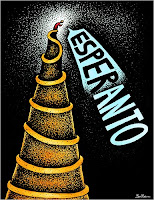 There's that joke that haunts every American attempting to expand h/er borders beyond the narrow continent:
There's that joke that haunts every American attempting to expand h/er borders beyond the narrow continent: Q: What do you call someone who speaks two languages?
A: Bilingual
Q: Three languages?
A: Trilingual
Q: One?
A: American.
Hardly encouraging when living within these borders and attempting to break the stereotype. Still, how often do I see this stereotype confirmed in the attitudes of most members in this society, even those who'd I expect otherwise. It is far too convenient to remain monolingual on this island... er, wait, we have neighbors to the north and south, and might boast of the most diverse communities--at least on the coasts, that is.
While English is the unofficial language of this nation, somehow we fear that learning a little of another language might topple this lingua domināns. Though this fear may be a bit unwarranted, I expect. No matter how hard we try to preserve English, it continues to be the global language most often learned as a second/other/foreign language in other countries. Experts suspect that before too long the number of non-native (proficient) English speakers in the world will trump the native English speakers. Before taking a collective sigh, all you linguistic imperialists, let us consider what this says about language ownership, representation, and how this corresponds to outdated nationhood identities, in general. Sure, we are clan creatures by nature and consequently need to latch on to that which distinguishes us from the other. But perhaps we might consider softening our grip on something so fluid as language. As a teacher, I understand the desire to try to keep English in place with a prescriptive grammar. But who really owns it anyway? The French and their ministry provide a definitive answer to this, believing that the one crucial way to preserve the culture is to preserve the language. I suppose every nation needs a narrative to highlight the lines of demarcation.
I don't know whether I agree entirely with the French on this point, but it seems far less vulgar coming from a country that embraces other languages more freely (or do they?). European countries may consider it a matter of political and economic survival, or simply, on a personal level, a reality that one is faced with on a daily basis: I am surrounded by other languages; I must conform. For those who remain monolingual, bilingualism is often viewed as a commodity, a sum of two languages, and, with some strange, vague way, that which is obtained along with an official certificate somewhere denoting fluency. There is little thought on the ever-present struggle: finding the vocabulary, the ideational, imaginative, or interpersonal functions; there is the constant battle for proficiency in every domain (writing, reading, speaking, and listening); and, of course, there is the fight to be authentic (i.e., correct). There is never enough with language, only a sense of adequate, and even that can topple.
Anyone who has attempted really learning a language beyond a college semester or two knows that second language competence is more than mere spewing of polished phrases to impress your friends. I cringe when a friend remarks at my ability to say a few phrases in Japanese. They express amazement at my ability to, say order when at an authentic restaurant. I can only imagine they have this false sense of what it means to be bilingual. They see the end, but do not fathom the process. There is no end, only struggle.
wait, there's more...
Image source: From Babel to Esperanto (Ben Heine)





